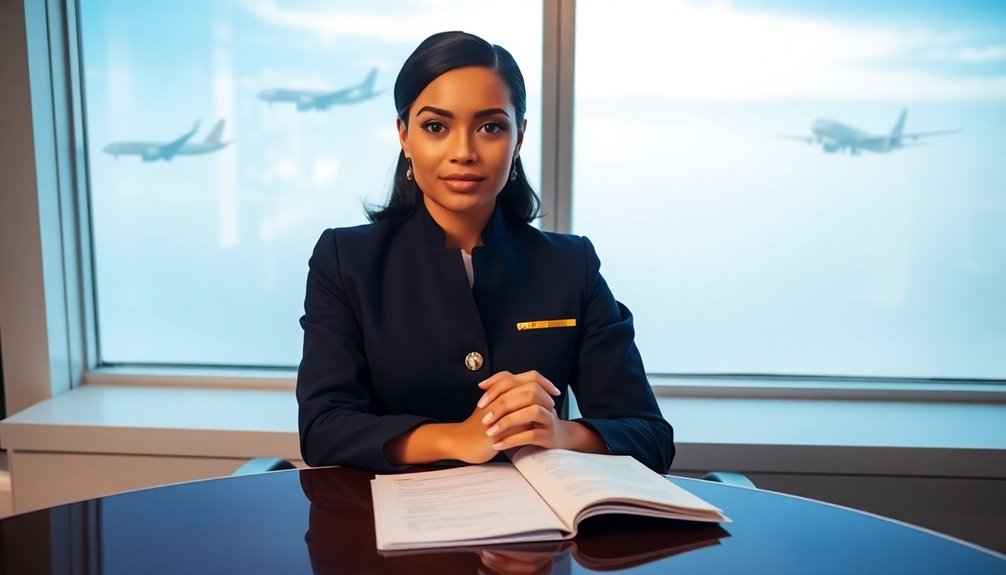Mastering flight attendant interview questions means you're ready to showcase your skills and enthusiasm. Start by highlighting your customer service abilities and adaptability to work in a team or independently. Be prepared to discuss your understanding of the role's demands and safety protocols. Mention any relevant experiences, like handling stressed customers or multitasking in fast-paced environments. Show genuine interest in the airline by researching its values and fleet. Ultimately, remember to engage with interviewers through thoughtful questions that reflect your excitement for the role. There's so much more you can discover to prepare effectively for your interview.
Key Takeaways
- Prepare to articulate your strengths using three descriptive words that align with the flight attendant role.
- Research the airline's values and customer service reputation to express genuine interest in joining their team.
- Highlight relevant experience in customer service, emphasizing stress management and multitasking abilities in previous roles.
- Familiarize yourself with emergency protocols and be ready to discuss your ability to respond calmly in high-pressure situations.
- Showcase your enthusiasm for travel and helping others to leave a positive impression during the interview.
Common Interview Questions

When preparing for a flight attendant interview, you can expect to face a range of common questions that assess your personality, skills, and fit for the role.
You'll likely be asked to describe yourself in three words, so choose those that highlight your strengths. Questions about the qualities of a good flight attendant will test your understanding of the role's demands.
Be ready to discuss your fluency in additional languages, as this can be a significant asset. You might also need to express your preference for independent work versus teamwork, showcasing your adaptability.
Additionally, understanding the primary duties of a flight attendant will demonstrate your preparation and commitment to the job.
Demonstrating Job Interest

Expressing genuine interest in the flight attendant position is essential in making a positive impression during your interview. Show that you've researched the airline, including its values, destinations, and fleet. This not only demonstrates your passion but also your commitment to being part of the team.
When discussing your interest, share specific reasons why you want to work for that airline, whether it's their customer service reputation or commitment to safety. Ask thoughtful questions about the company's culture and future plans, which reflects your engagement.
Highlighting your enthusiasm for travel and helping others also reinforces your fit for the role. Ultimately, showcasing your excitement can set you apart from other candidates and leave a lasting impression.
Highlighting Relevant Experience

Relevant experience is essential for standing out in a flight attendant interview. When you discuss your background, focus on roles that showcase transferable skills. Highlight any previous positions in hospitality, travel, or customer service, as these experiences resonate well with airline expectations.
If you've worked in fast-paced environments, emphasize your ability to handle stress and multitask effectively. Mention any specific achievements, like awards or recognitions, to illustrate your commitment and success in those roles.
Additionally, if you've had exposure to diverse cultures or languages, share that too, as it demonstrates adaptability. Tailor your experience to align with the flight attendant role, ensuring interviewers see how your past prepares you for this new challenge.
Customer Service Skills

Exceptional customer service skills are essential for flight attendants, as they directly impact passenger satisfaction and overall flight experience.
You'll need to engage with passengers warmly and attentively, making them feel valued and comfortable throughout the journey. Active listening is vital; it allows you to understand their needs and respond appropriately.
Remember, empathy goes a long way—addressing concerns with compassion can ease anxiety and build rapport. Sharing positive experiences from previous customer service roles can showcase your abilities.
Highlight techniques you use to create a pleasant environment, like offering assistance with luggage or providing timely updates during delays.
Ultimately, your goal is to exceed expectations, ensuring every passenger leaves with a positive impression of their flying experience.
Conflict Resolution Techniques

While providing outstanding customer service sets the foundation for a positive flying experience, knowing how to effectively resolve conflicts is just as important. You'll encounter challenging situations with passengers and colleagues, so mastering conflict resolution techniques is essential.
Here's a quick reference table to guide you:
| Technique | Description | Application |
|---|---|---|
| Active Listening | Fully concentrate on the speaker | Acknowledge passenger concerns |
| Empathy | Understand and share feelings | Connect with upset customers |
| Calm Demeanor | Maintain composure | De-escalate tense situations |
| Clear Communication | Convey messages simply and clearly | Avoid misunderstandings |
Utilizing these techniques will help you navigate conflicts smoothly and maintain a positive atmosphere on board. Additionally, practicing positive reinforcement techniques can enhance your ability to de-escalate conflicts effectively.
Emergency Preparedness

Emergency preparedness is essential for flight attendants, as they're often the first line of response in critical situations. You need to be well-versed in safety protocols, including how to handle medical emergencies, evacuations, and potential threats.
Being calm and collected helps reassure passengers during high-stress moments. You'll conduct pre-flight safety checks and briefings, ensuring everyone understands emergency procedures. Familiarizing yourself with the aircraft's safety equipment and layout is vital, too.
In interviews, be prepared to discuss specific scenarios where you demonstrated your ability to act swiftly and effectively. Highlight your training in first aid, CPR, and how you maintain your composure under pressure.
Your readiness can make a significant difference in ensuring passenger safety during emergencies.
Interview Preparation Tips

Preparing for your flight attendant interview can greatly boost your chances of success. Start by researching the airline's values and services. Know the destinations they fly to and familiarize yourself with their fleet. Practice common interview questions, focusing on your customer service experiences and conflict resolution skills.
Here's a quick reference table to help you prepare:
| Preparation Tip | Action Item | Resource |
|---|---|---|
| Research the Airline | Visit website and social media | Airline's official site |
| Review Common Questions | Write down answers | Online forums |
| Dress Professionally | Choose appropriate attire | Fashion blogs |
| Practice Mock Interviews | Role-play with a friend | Interview preparation books |
| Prepare Questions for Employer | List thoughtful inquiries | Company info sources |
With these tips, you'll feel more confident and ready for your interview!
Career Advancement Paths

As a flight attendant, you have several exciting career advancement paths to explore. You can aim for supervisory or managerial roles, where you'll oversee crew operations and training.
If you're passionate about safety, consider specializing in safety training or becoming a safety officer. For those seeking a change in scenery, shifting to corporate or private flight services offers new experiences and responsibilities.
Continuous skill development is essential; attending workshops and pursuing certifications can enhance your qualifications. Networking within the industry can also lead to mentorship opportunities, helping you navigate your career journey.
Frequently Asked Questions
How Do You Handle Cultural Differences Among Passengers?
When you handle cultural differences among passengers, you stay observant and respectful.
You listen actively to understand their needs and preferences, ensuring everyone feels valued.
You use inclusive language and avoid assumptions, creating a welcoming atmosphere.
If conflicts arise, you address them calmly and diplomatically, facilitating open communication.
What Motivates You to Excel in This Role?
Picture yourself soaring above the clouds, surrounded by diverse passengers, each with a unique story.
What drives you to excel in this role is the thrill of creating memorable experiences. You find joy in making someone's journey smoother, whether through a friendly smile or a helpful gesture.
The dynamic environment fuels your passion, as you thrive on teamwork, tackle challenges, and embrace the opportunity to connect with people from all walks of life.
Describe a Time You Went Above and Beyond for a Passenger
Think about a time you went above and beyond for a passenger.
Maybe you noticed someone struggling with their luggage and offered to help, ensuring they felt comfortable and valued.
Or perhaps you took the extra time to address a passenger's concerns, providing personalized service that turned their experience around.
Those moments not only showcase your dedication but also highlight your ability to create a positive atmosphere, making the flight memorable for everyone.
How Do You Maintain Work-Life Balance With Irregular Hours?
Maintaining work-life balance with irregular hours can be challenging, but it's crucial for your well-being.
You can prioritize your time by scheduling downtime and creating a routine that adapts to your flight schedule. Staying organized helps you manage your commitments, and making time for hobbies or relaxation is essential.
Communicating with friends and family about your schedule guarantees they understand your availability, fostering support and connection even when you're away.
What Do You Believe Are the Biggest Challenges Facing Flight Attendants Today?
You might find that flight attendants today navigate a whirlwind of challenges.
The demands of irregular schedules can wear you down, while the increasing expectations for exceptional customer service require constant adaptability.
Additionally, managing diverse passenger needs and maintaining safety in a dynamic environment can feel like juggling flaming torches.
With the industry's rapid changes, staying updated on protocols and technology only adds to the complexity of the role.
It's a balancing act that tests your resilience daily.
Conclusion
As you step into the interview room, let your passion take flight. With each answer, weave a tapestry of your experiences and skills, showing how you're the perfect fit for the cabin crew. Remember, every question is a chance to shine like a beacon in the sky, illuminating your customer service prowess and quick thinking. So, spread your wings, embrace the challenge, and let your enthusiasm soar—you're ready to commence this exciting journey!









